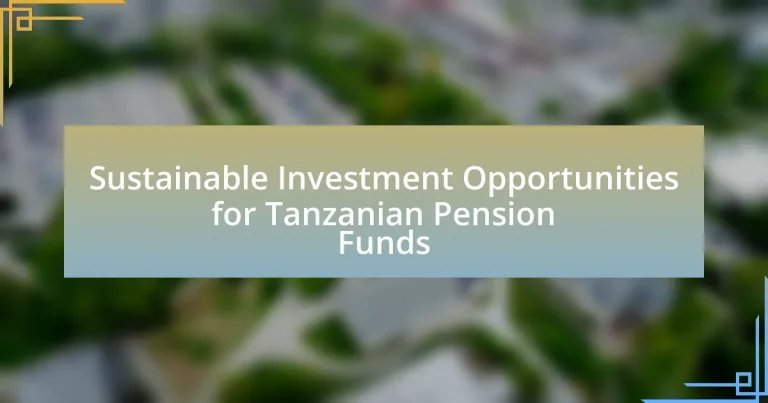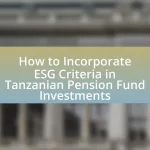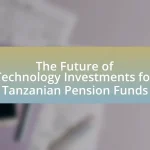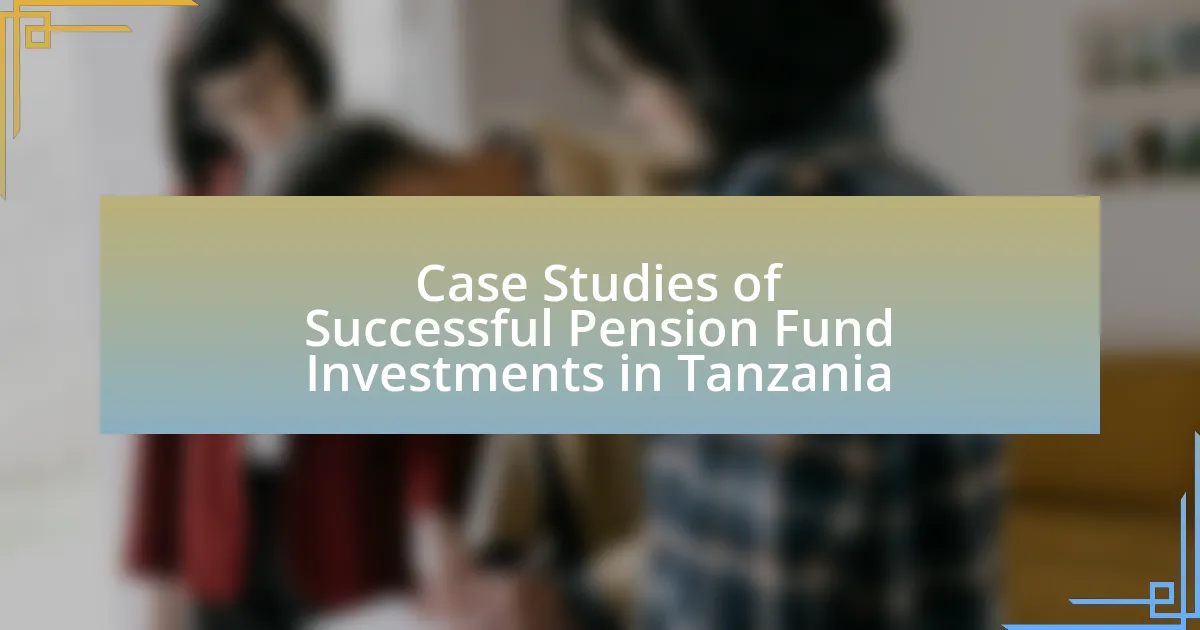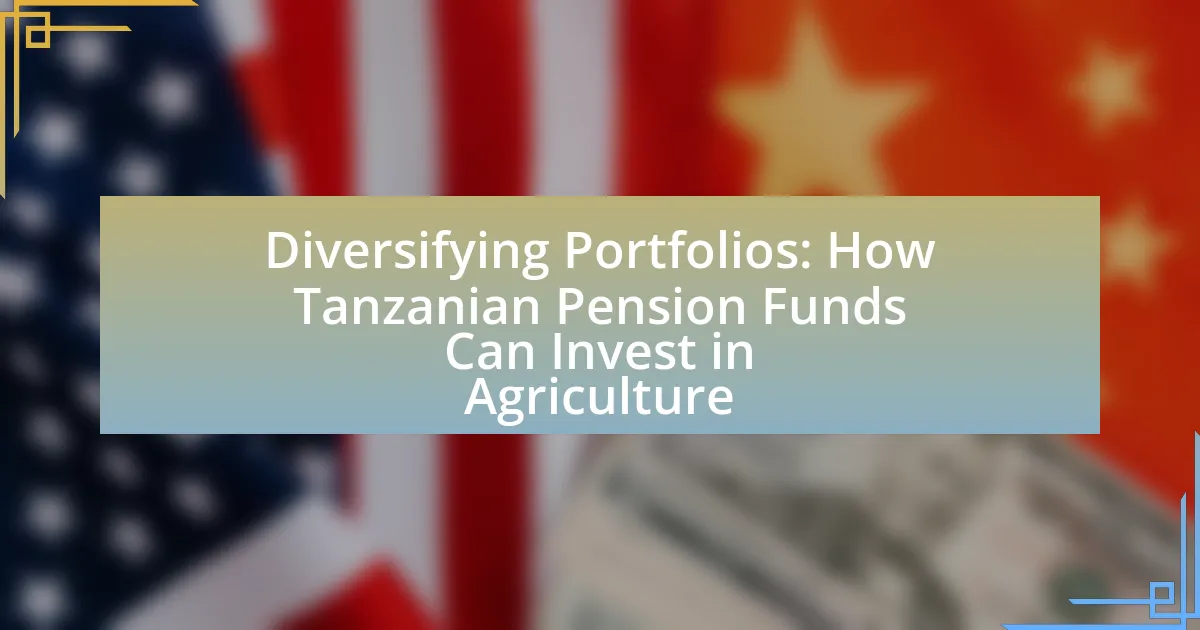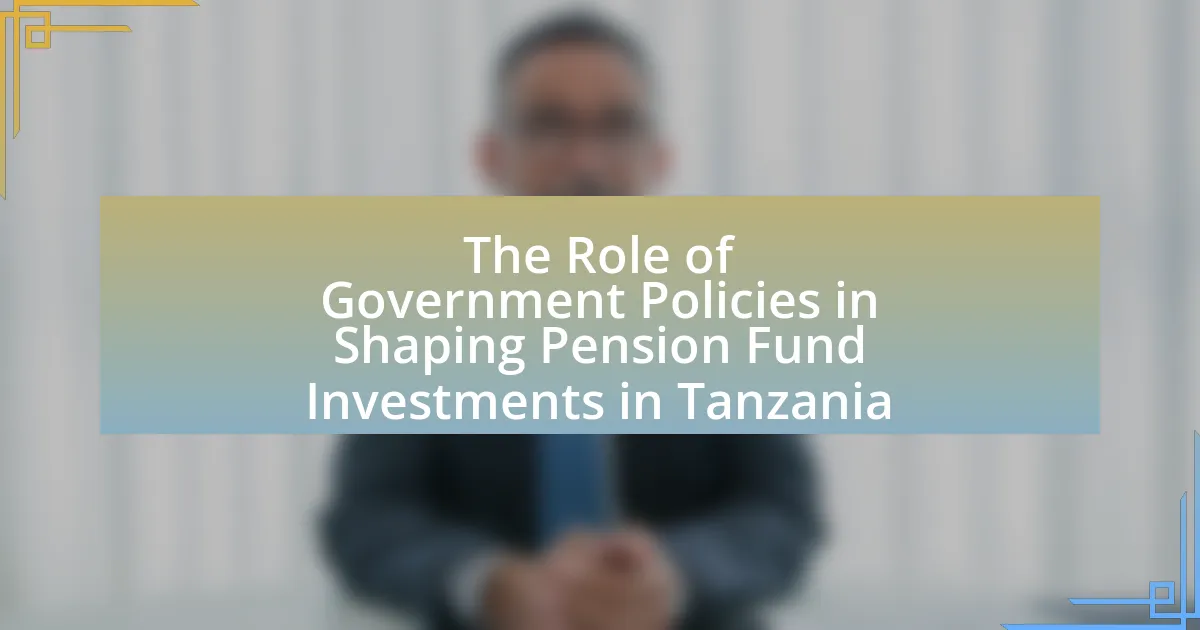The article focuses on sustainable investment opportunities for Tanzanian pension funds, highlighting sectors such as renewable energy, sustainable agriculture, and green infrastructure development. It outlines how these investments align with Tanzania’s sustainable development goals and offer potential long-term financial returns. The article also differentiates sustainable investments from traditional ones by emphasizing the importance of environmental, social, and governance (ESG) criteria. Furthermore, it discusses the challenges faced by Tanzanian pension funds in adopting sustainable practices, including regulatory barriers and a lack of awareness, while suggesting strategies for successful integration of sustainability into investment policies.
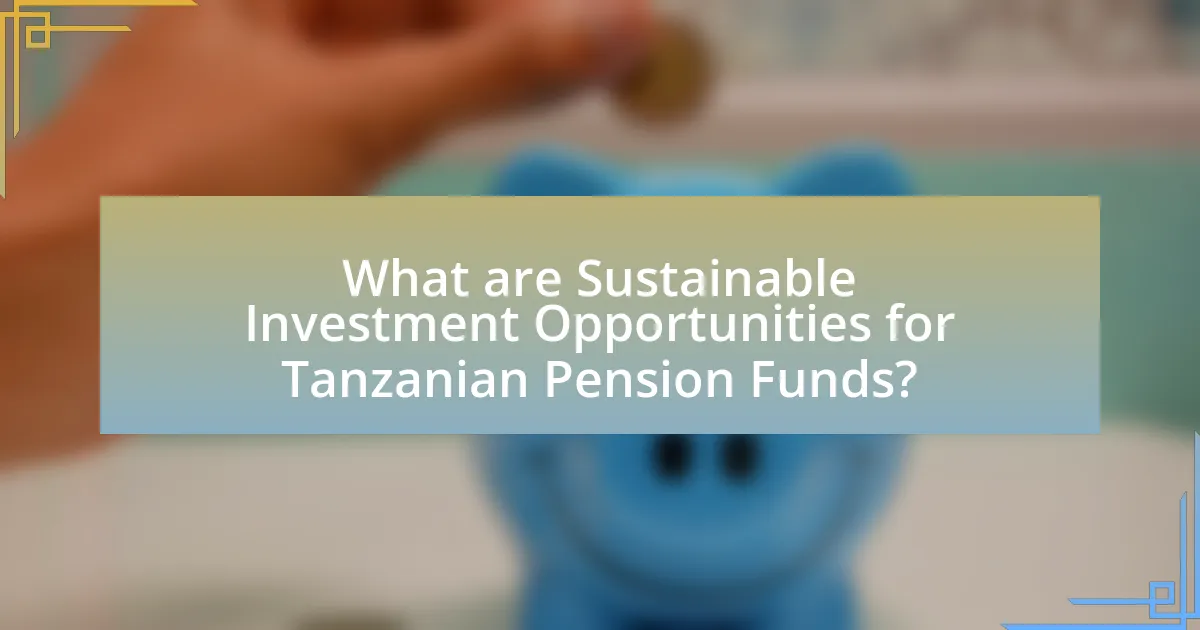
What are Sustainable Investment Opportunities for Tanzanian Pension Funds?
Sustainable investment opportunities for Tanzanian pension funds include renewable energy projects, sustainable agriculture, and green infrastructure development. These sectors align with Tanzania’s commitment to sustainable development and offer potential for long-term financial returns. For instance, the Tanzanian government aims to increase renewable energy capacity to 2,000 MW by 2025, creating investment avenues in solar, wind, and hydroelectric power. Additionally, sustainable agriculture initiatives can enhance food security while providing stable returns, as the agricultural sector contributes significantly to Tanzania’s GDP. Green infrastructure projects, such as eco-friendly transportation and waste management systems, also present viable investment options, supported by international funding and partnerships.
How do sustainable investments differ from traditional investments?
Sustainable investments prioritize environmental, social, and governance (ESG) criteria, while traditional investments focus primarily on financial returns. This distinction means that sustainable investments seek to generate positive societal impact alongside profit, often evaluating companies based on their sustainability practices, such as carbon emissions and labor policies. In contrast, traditional investments typically assess performance based solely on financial metrics, such as revenue growth and profitability, without considering the broader implications of their operations. The Global Sustainable Investment Alliance reported that sustainable investment assets reached $35.3 trillion globally in 2020, indicating a significant shift towards integrating ESG factors into investment strategies compared to traditional approaches.
What criteria define a sustainable investment?
Sustainable investments are defined by criteria that include environmental, social, and governance (ESG) factors. These criteria assess how an investment impacts the environment, society, and corporate governance practices. For instance, an investment is considered sustainable if it contributes to reducing carbon emissions, promotes social equity, and adheres to ethical governance standards. Research indicates that companies with strong ESG performance tend to have lower risks and better long-term financial returns, supporting the validity of these criteria in guiding sustainable investment decisions.
How do sustainable investments align with pension fund objectives?
Sustainable investments align with pension fund objectives by promoting long-term financial returns while addressing environmental, social, and governance (ESG) factors. Pension funds aim to secure stable and growing returns for their beneficiaries, and sustainable investments have been shown to mitigate risks associated with climate change and social inequality, ultimately enhancing portfolio resilience. Research indicates that companies with strong ESG practices often outperform their peers financially; for instance, a study by Morgan Stanley found that sustainable equity funds outperformed traditional funds by 3.9% annually from 2004 to 2018. This alignment supports pension funds in fulfilling their fiduciary duty while contributing positively to society and the environment.
Why are sustainable investments important for Tanzanian pension funds?
Sustainable investments are important for Tanzanian pension funds because they align financial returns with environmental, social, and governance (ESG) criteria, thereby mitigating risks associated with climate change and social instability. By integrating sustainability into their investment strategies, Tanzanian pension funds can enhance long-term financial performance and ensure the stability of retirement savings for their members. Research indicates that companies with strong ESG practices tend to outperform their peers, which is crucial for pension funds that aim to provide secure and adequate retirement benefits. Additionally, the Tanzanian government has emphasized sustainable development in its national policies, creating a favorable environment for pension funds to invest in green projects that contribute to economic growth while addressing social challenges.
What impact do sustainable investments have on long-term financial performance?
Sustainable investments positively impact long-term financial performance by enhancing risk-adjusted returns and reducing volatility. Research conducted by the Global Sustainable Investment Alliance indicates that sustainable investment strategies often outperform traditional investments over extended periods, with studies showing that companies with strong environmental, social, and governance (ESG) practices tend to exhibit better operational performance and lower capital costs. For instance, a meta-analysis by Friede, Busch, and Bassen in 2015 reviewed over 2,000 studies and found that approximately 90% of them reported a non-negative relationship between ESG factors and financial performance, reinforcing the notion that sustainable investments can lead to superior long-term financial outcomes.
How do sustainable investments contribute to social and environmental goals?
Sustainable investments contribute to social and environmental goals by directing capital towards projects and companies that prioritize ecological sustainability and social responsibility. These investments often focus on renewable energy, sustainable agriculture, and affordable housing, which help reduce carbon emissions, promote biodiversity, and improve community welfare. For instance, a report by the Global Sustainable Investment Alliance indicates that sustainable investments reached $35.3 trillion globally in 2020, reflecting a growing recognition of their role in addressing climate change and social inequalities. By aligning financial returns with positive societal impacts, sustainable investments foster a more equitable and environmentally friendly economy.
What challenges do Tanzanian pension funds face in sustainable investing?
Tanzanian pension funds face several challenges in sustainable investing, primarily due to limited regulatory frameworks and a lack of awareness among stakeholders. The regulatory environment in Tanzania does not provide clear guidelines or incentives for sustainable investment practices, which hinders pension funds from integrating environmental, social, and governance (ESG) criteria into their investment strategies. Additionally, many fund managers and trustees lack the necessary knowledge and training to assess sustainable investment opportunities effectively. This gap in expertise can lead to missed opportunities for long-term value creation and risk mitigation. Furthermore, the local market’s underdeveloped sustainable investment products limits the options available for pension funds, making it difficult to diversify their portfolios in a sustainable manner.
What regulatory barriers exist for sustainable investments in Tanzania?
Regulatory barriers for sustainable investments in Tanzania include a lack of comprehensive legal frameworks, insufficient incentives for green investments, and bureaucratic hurdles in project approvals. The absence of specific regulations promoting sustainable finance limits the ability of pension funds to invest in environmentally friendly projects. Additionally, the regulatory environment is often characterized by lengthy approval processes and a lack of clarity in policies, which can deter potential investors. For instance, the Tanzania Investment Centre has been criticized for its slow processing times, which can hinder timely investments in sustainable initiatives.
How can pension funds overcome these challenges?
Pension funds can overcome challenges by diversifying their investment portfolios to include sustainable assets, which can yield long-term financial benefits. By allocating funds to renewable energy, sustainable agriculture, and green infrastructure, pension funds can mitigate risks associated with traditional investments and align with global sustainability goals. Research indicates that sustainable investments can outperform conventional investments over time; for instance, a study by the Morgan Stanley Institute for Sustainable Investing found that sustainable equity funds outperformed their traditional counterparts by 4.3% annually from 2004 to 2018. This evidence supports the strategy of integrating sustainability into investment decisions, enabling pension funds to address both financial and environmental challenges effectively.
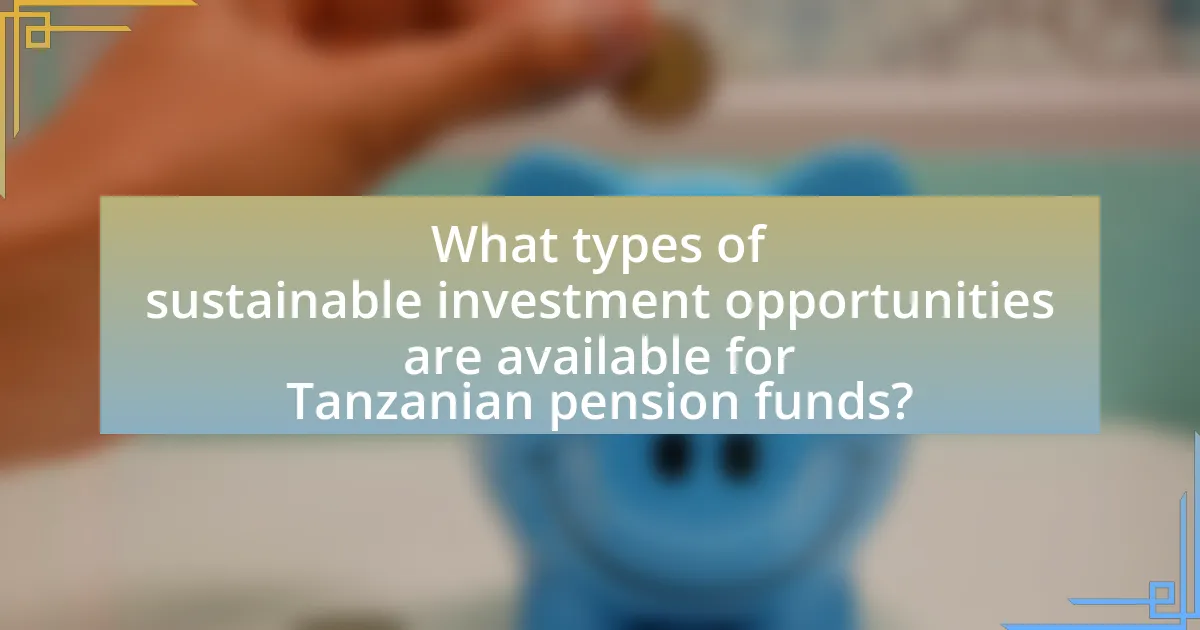
What types of sustainable investment opportunities are available for Tanzanian pension funds?
Tanzanian pension funds have access to various sustainable investment opportunities, including renewable energy projects, sustainable agriculture, and green infrastructure development. These sectors are increasingly recognized for their potential to generate long-term financial returns while contributing to environmental sustainability. For instance, investments in solar and wind energy projects align with Tanzania’s goal to increase renewable energy capacity, which is projected to reach 2,000 MW by 2025. Additionally, sustainable agriculture initiatives can enhance food security and promote eco-friendly farming practices, benefiting both the economy and the environment. Green infrastructure projects, such as sustainable urban development and waste management systems, further provide avenues for pension funds to invest in socially responsible initiatives that support national development goals.
What sectors offer the most promising sustainable investment opportunities?
The sectors that offer the most promising sustainable investment opportunities include renewable energy, sustainable agriculture, and green technology. Renewable energy, particularly solar and wind, is rapidly growing, with global investments reaching over $300 billion in 2020, indicating strong market potential. Sustainable agriculture focuses on practices that enhance food security while minimizing environmental impact, with the global organic food market projected to reach $320 billion by 2025. Green technology encompasses innovations that improve energy efficiency and reduce carbon emissions, with investments in this sector expected to exceed $2 trillion by 2025. These sectors not only align with sustainability goals but also present significant financial returns, making them attractive for investment by Tanzanian pension funds.
How does renewable energy present investment opportunities?
Renewable energy presents investment opportunities by offering long-term growth potential and stable returns, driven by increasing global demand for clean energy solutions. The International Renewable Energy Agency reported that the renewable energy sector attracted over $300 billion in investments in 2020, indicating robust market interest. Additionally, government incentives and policies aimed at reducing carbon emissions further enhance the attractiveness of renewable energy investments, as seen in Tanzania’s commitment to increasing its renewable energy capacity, which is projected to create new market avenues for pension funds.
What role does sustainable agriculture play in investment strategies?
Sustainable agriculture plays a crucial role in investment strategies by aligning financial returns with environmental and social responsibility. Investors increasingly recognize that sustainable agricultural practices can lead to long-term profitability, reduce risks associated with climate change, and meet the growing consumer demand for ethically produced food. For instance, a report by the Food and Agriculture Organization indicates that sustainable farming can enhance productivity and resilience, making it an attractive option for pension funds seeking stable returns. Additionally, investments in sustainable agriculture can contribute to the United Nations Sustainable Development Goals, further appealing to socially conscious investors.
How can pension funds assess the viability of sustainable investments?
Pension funds can assess the viability of sustainable investments by conducting thorough due diligence that includes evaluating environmental, social, and governance (ESG) criteria. This assessment involves analyzing the potential financial returns alongside the sustainability impact, using metrics such as carbon footprint, resource efficiency, and social responsibility. Research indicates that companies with strong ESG practices often outperform their peers financially, as evidenced by a 2020 study from the Morgan Stanley Institute for Sustainable Investing, which found that sustainable equity funds outperformed traditional funds by 4.3% during market downturns. Additionally, pension funds can utilize third-party ESG ratings and frameworks, such as the Global Reporting Initiative, to benchmark and compare investment opportunities effectively.
What metrics should be used to evaluate sustainable investment performance?
To evaluate sustainable investment performance, key metrics include Environmental, Social, and Governance (ESG) scores, carbon footprint analysis, and impact measurement. ESG scores assess a company’s adherence to sustainable practices, with higher scores indicating better performance in environmental stewardship, social responsibility, and governance structures. Carbon footprint analysis quantifies greenhouse gas emissions, providing insight into the environmental impact of investments. Impact measurement evaluates the social and environmental outcomes generated by investments, often using frameworks like the Global Impact Investing Network’s IRIS metrics. These metrics collectively offer a comprehensive view of sustainable investment performance, enabling investors to make informed decisions aligned with sustainability goals.
How can pension funds conduct due diligence on sustainable projects?
Pension funds can conduct due diligence on sustainable projects by implementing a structured evaluation process that assesses environmental, social, and governance (ESG) criteria. This process includes analyzing project feasibility, assessing compliance with sustainability standards, and evaluating the potential impact on local communities and ecosystems.
For instance, pension funds can utilize frameworks such as the Global Reporting Initiative (GRI) or the Sustainability Accounting Standards Board (SASB) to guide their assessments. Additionally, engaging third-party auditors or sustainability consultants can provide independent verification of a project’s sustainability claims. Research indicates that integrating ESG factors can enhance long-term financial performance, as evidenced by a study from the University of Oxford, which found that companies with strong sustainability practices outperform their peers in the long run.
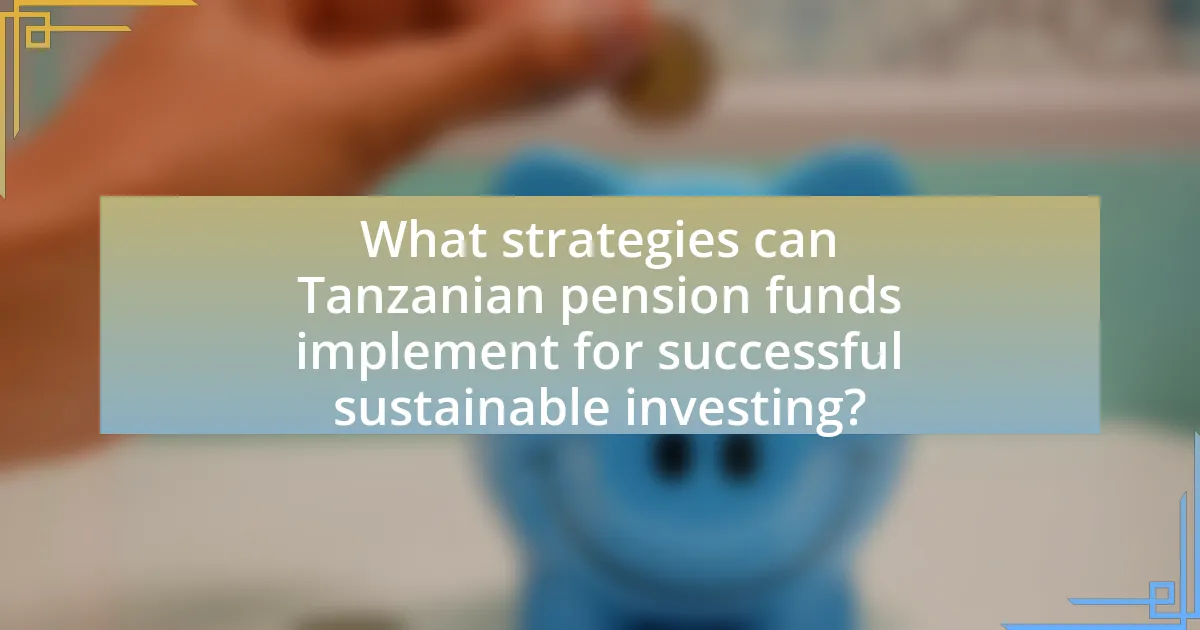
What strategies can Tanzanian pension funds implement for successful sustainable investing?
Tanzanian pension funds can implement strategies such as integrating environmental, social, and governance (ESG) criteria into their investment processes to achieve successful sustainable investing. By adopting ESG frameworks, these funds can assess the long-term sustainability and ethical impact of their investments, which is increasingly important for attracting socially conscious investors.
Additionally, pension funds can engage in active ownership by voting on shareholder resolutions related to sustainability and collaborating with companies to improve their ESG practices. This approach not only enhances the funds’ influence but also promotes better corporate behavior, which can lead to improved financial performance over time.
Furthermore, investing in renewable energy projects and sustainable infrastructure can provide both financial returns and positive environmental impacts, aligning with global trends towards sustainability. According to the Global Sustainable Investment Alliance, sustainable investment assets reached $35.3 trillion globally in 2020, indicating a growing market that Tanzanian pension funds can tap into for diversification and risk management.
By focusing on these strategies, Tanzanian pension funds can position themselves as leaders in sustainable investing while contributing to the country’s economic development and environmental sustainability.
How can pension funds integrate sustainability into their investment policies?
Pension funds can integrate sustainability into their investment policies by adopting Environmental, Social, and Governance (ESG) criteria in their investment decision-making processes. This approach involves evaluating potential investments based on their environmental impact, social responsibility, and governance practices, ensuring that funds support sustainable businesses and projects. For instance, a study by the Global Sustainable Investment Alliance reported that sustainable investment assets reached $30.7 trillion globally in 2018, indicating a growing trend among institutional investors to prioritize sustainability. By aligning their portfolios with ESG principles, pension funds not only contribute to sustainable development but also mitigate risks associated with climate change and social unrest, ultimately enhancing long-term financial performance.
What best practices should be followed for sustainable investment integration?
Best practices for sustainable investment integration include establishing a clear investment policy that incorporates environmental, social, and governance (ESG) criteria. This policy should be aligned with the fund’s overall objectives and risk tolerance. Additionally, conducting thorough due diligence on potential investments to assess their sustainability impact is crucial. Engaging with stakeholders, including beneficiaries and investment managers, ensures that diverse perspectives are considered in decision-making. Regular monitoring and reporting on the sustainability performance of investments help maintain accountability and transparency. Research indicates that funds integrating ESG factors can achieve competitive financial returns while contributing to sustainable development, as evidenced by a study from the Global Sustainable Investment Alliance, which reported that sustainable investments reached $35.3 trillion globally in 2020, reflecting a 15% increase from 2018.
How can stakeholder engagement enhance sustainable investment outcomes?
Stakeholder engagement enhances sustainable investment outcomes by fostering collaboration and aligning interests among investors, companies, and communities. This collaborative approach leads to better decision-making, as stakeholders provide diverse perspectives that can identify risks and opportunities related to sustainability. For instance, a study by the Global Sustainable Investment Alliance found that companies with strong stakeholder engagement practices tend to outperform their peers in terms of financial returns and sustainability metrics. Engaging stakeholders also builds trust and transparency, which can attract more investment and improve long-term performance.
What role does collaboration play in enhancing sustainable investment opportunities?
Collaboration plays a crucial role in enhancing sustainable investment opportunities by pooling resources, expertise, and networks among various stakeholders. When pension funds, government entities, and private investors collaborate, they can share best practices, reduce risks, and increase the scale of sustainable projects. For instance, a study by the Global Sustainable Investment Alliance reported that collaborative efforts in sustainable finance have led to a 34% increase in investments in renewable energy projects globally from 2018 to 2020. This demonstrates that collaboration not only amplifies financial resources but also fosters innovation and accelerates the transition to sustainable practices, making it essential for maximizing the impact of investments in sustainability.
How can partnerships with local communities improve investment success?
Partnerships with local communities can significantly improve investment success by fostering trust, enhancing local knowledge, and ensuring alignment with community needs. When investors collaborate with local stakeholders, they gain insights into cultural, social, and economic dynamics that can inform better decision-making. For instance, a study by the World Bank found that community engagement in investment projects leads to a 30% increase in project success rates, as local input helps tailor initiatives to actual needs and reduces resistance. Additionally, such partnerships can enhance the sustainability of investments, as community support often translates into long-term viability and reduced operational risks.
What benefits arise from collaborating with other investors in sustainable projects?
Collaborating with other investors in sustainable projects enhances resource sharing, risk mitigation, and access to diverse expertise. By pooling financial resources, investors can undertake larger projects that may be unfeasible individually, leading to economies of scale. Additionally, collaboration allows for the distribution of financial risk among multiple parties, reducing the burden on any single investor. Access to a broader range of expertise and perspectives fosters innovative solutions and improves project outcomes. For instance, a study by the Global Impact Investing Network highlights that collaborative investments can lead to a 20% increase in project success rates due to shared knowledge and resources.
What practical steps can Tanzanian pension funds take to start investing sustainably?
Tanzanian pension funds can start investing sustainably by integrating Environmental, Social, and Governance (ESG) criteria into their investment strategies. This involves conducting thorough assessments of potential investments to evaluate their sustainability practices, such as carbon emissions, labor practices, and board diversity.
Additionally, pension funds should collaborate with local and international organizations that specialize in sustainable investment to gain insights and access to sustainable investment opportunities. For instance, joining networks like the UN Principles for Responsible Investment can provide valuable resources and frameworks for implementing sustainable practices.
Furthermore, establishing a dedicated team or committee focused on sustainable investments can enhance decision-making processes and ensure alignment with sustainability goals. This approach is supported by the growing trend of global investors prioritizing ESG factors, which has been shown to lead to better long-term financial performance.
What resources are available for pension funds to learn about sustainable investing?
Pension funds can access various resources to learn about sustainable investing, including industry reports, online courses, and specialized organizations. Notable resources include the Principles for Responsible Investment (PRI), which offers guidance and tools for integrating ESG factors into investment decisions. Additionally, the Global Sustainable Investment Alliance (GSIA) provides comprehensive reports on global sustainable investment trends, which can inform pension funds about best practices. Online platforms like Coursera and edX offer courses on sustainable finance, enabling pension fund managers to enhance their knowledge. Furthermore, academic journals such as the Journal of Sustainable Finance & Investment publish research that can deepen understanding of sustainable investment strategies.
How can pension funds measure the impact of their sustainable investments?
Pension funds can measure the impact of their sustainable investments through a combination of quantitative metrics and qualitative assessments. Quantitative metrics include tracking financial performance indicators such as return on investment (ROI), risk-adjusted returns, and comparing these against benchmarks for sustainable investments. Qualitative assessments involve evaluating the social and environmental outcomes of investments, such as reductions in carbon emissions or improvements in community well-being. Research by the Global Sustainable Investment Alliance indicates that integrating ESG (Environmental, Social, and Governance) criteria into investment analysis can enhance long-term financial performance, providing a framework for pension funds to assess both financial and impact metrics effectively.
